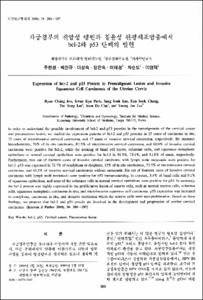자궁경부의 전암성 병변과 침윤성 편평세포암종에서 bcl-2와 p53 단백의 발현
- Keimyung Author(s)
- Park, Kwan Kyu; Lee, Sang Sook; Chang, Eun Sook; Lee, Tae Sung; Cha, Soon Do
- Journal Title
- 대한병리학회지
- Issued Date
- 2000
- Volume
- 34
- Issue
- 4
- Abstract
- In order to understand the possible involvement of bcl-2 and p53 proteins in the tumorigenesis of the cervical cancer and precancerous lesion, we studied the expression patterns of bcl-2 and p53 proteins in 25 cases of carcinoma in situ, 12 cases of microinvasive cervical carcinoma, and 37 cases of invasive cervical carcinoma, respectively. By immunohistochemistry, 76% of in situ carcinoma, 83.3% of microinvasive cervical carcinoma, and 60.9% of invasive cervical carcinoma were positive for bcl-2, while the staining of basal cell layers, columnar cells, and squamous metaplastic epithelium of normal cervical epithelium were positive for bcl-2 in 91.9%, 73.1%, and 81.8% of cases, respectively. Furthermore, two out of fourteen cases of invasive cervical carcinoma with lymph node metastasis were positive for bcl-2. p53 was expressed in 72.7% of condyloma or dysplasia, 12% of in situ carcinomas, 33.3% of microinvasive cervical carcinoma, and 43.5% of invasive cervical carcinomas without metastasis. Six out of fourteen cases of invasive cervical carcinoma with lymph node metastasis were positive for p53 immunostaining. In contrast, 5.4% of basal cells and 9.1% of squamous epithelium, and none of the columnar cells in normal cervical epithelium were positive for p53. In summary, the bcl-2 protein was highly expressed in the proliferative lesion of reserve cells, such as normal reserve cells, columnar cells, squamous metaplasia, carcinoma in situ, and microinvasive squamous cell carcinoma. p53 expression was increased in condyloma, carcinoma in situ, and invasive carcinoma where the reserve cells were non-proliferative. Based on these findings, we propose that bcl-2 and p53 protein are involved in the development and progression of uterine cervical carcinoma.
Key Words: bcl-2; p53; Cervical cancer; Precancerous lesion
- Alternative Title
- Expression of bcl-2 and p53 Protein in Premalignant Lesion and Invasive Squamous Cell Carcinoma of the Uterine Cervix.
- Publisher
- School of Medicine
- Citation
- 주현창 et al. (2000). 자궁경부의 전암성 병변과 침윤성 편평세포암종에서 bcl-2와 p53 단백의 발현. 대한병리학회지, 34(4), 280–287.
- Type
- Article
- ISSN
- 0379-1149
- Appears in Collections:
- 1. School of Medicine (의과대학) > Dept. of Obstetrics & Gynecology (산부인과학)
1. School of Medicine (의과대학) > Dept. of Pathology (병리학)
- 파일 목록
-
-
Download
 oak-bbb-1163.pdf
기타 데이터 / 18 MB / Adobe PDF
oak-bbb-1163.pdf
기타 데이터 / 18 MB / Adobe PDF
-
Items in Repository are protected by copyright, with all rights reserved, unless otherwise indicated.